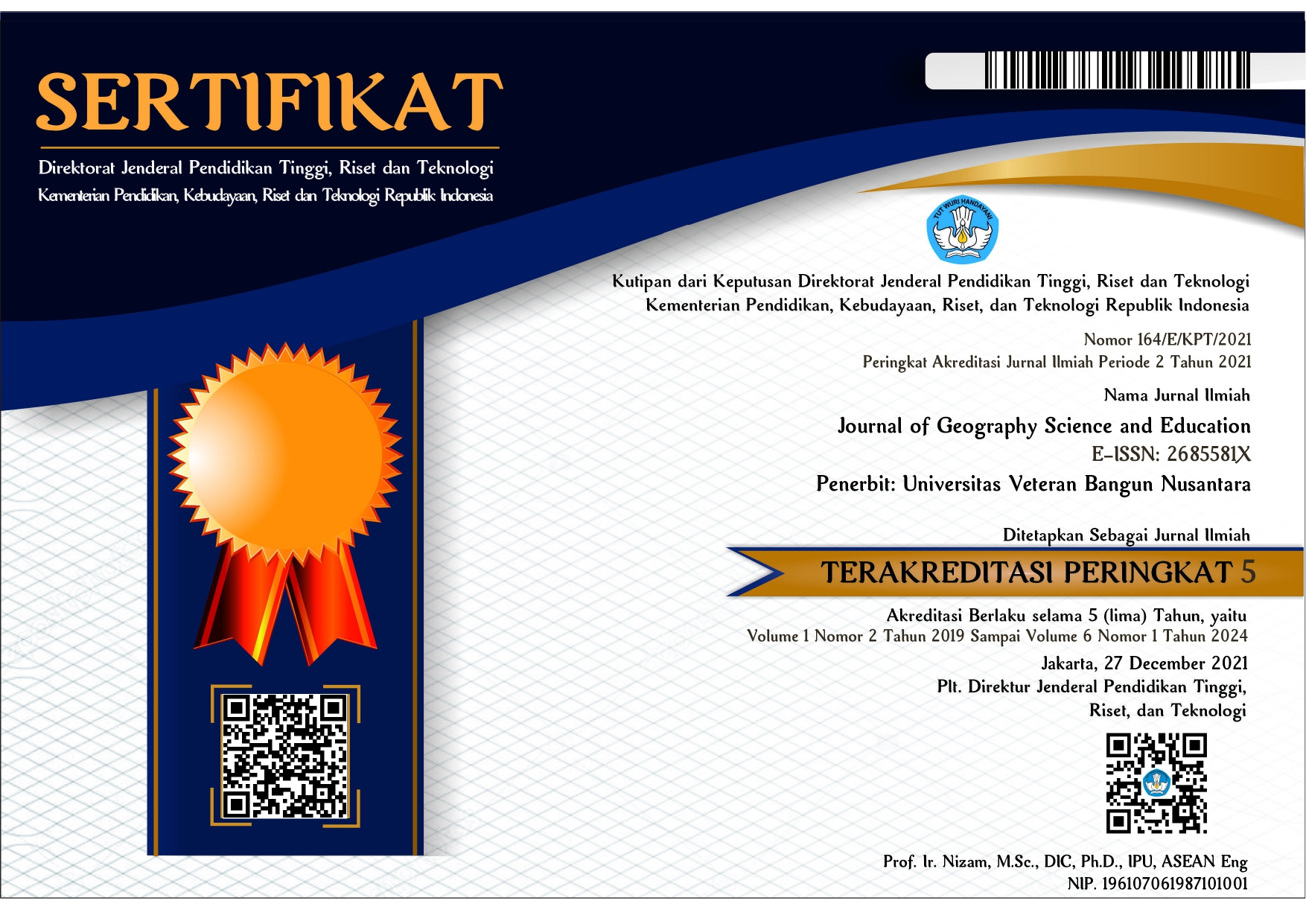The Influence of Project Based Learning (PJBL) Learning Model on Spatial Thinking Ability in Class X Geography Learning Eyes in SMA PGRI 2 Palembang
DOI:
https://doi.org/10.32585/jgse.v2i1.828Abstrak
One of the goals of learning geography is to give students the ability to think spatially. But based on observations in the field, it shows that students' spatial thinking skills have not shown maximum results. This study aims to determine the effect of the Project Based Learning (PJBL) learning model on spatial thinking skills in class X geography subjects at SMA PGRI 2 Palembang. To determine the effect of Project Based Learning (PJBL) on spatial thinking skills, the researcher used the Experimental method.
Based on the results of data analysis and discussion on the effect of Project Based Learning (PJBL) learning models on spatial thinking skills in class X geography subjects at SMA PGRI 2 Palembang, it can be concluded that the results of the average data analysis results of the students' experimental class spatial thinking test 76.02 while the control class averages 61.72. Based on the results of the t-test obtained thitung = 8.43 then compared with ttable = 1.66, then tcount> ttable is 8.43> 1.66. These results prove that there is a significant influence between the Project Based Learning (PJBL) learning model on spatial thinking skills in class X geography subjects at SMA PGRI 2 Palembang.
Unduhan
Referensi
Arikunto, Suharsimi. (2017). Prosedur Penelitian Suatu Pendekatan Praktik. Jakarta: Rineka Cipta.
Hamzah, Iqbal Nur, Ali Imron dan Yustina Sri Ekwandari. (2016). Pengaruh Model Project Based Learning (PJBL) Terhadap Peningkatan Motivasi Belajar Sejarah Siswa: Jurnal Pendidikan.
Oktavianto, Dwi Angga, Sumarni dan Budi Handoyo. (2017). Pengaruh Pembelajaran Berbasis Proyek Berbantuan Google Earth Terhadap Keterampilan Berpikir Spasial: Jurnal Teknodik. Volume 21(1):1-11.
Sarwono, Sigit Santoso dan Soegiyanto S.U. (2016). Pengaruh Model Pembelajaran Project Based Learning Terhadap Pengetahuan Bencana Alam Di Indonesia dan Perilaku Cinta Lingkungan Hidup Siswa Kelas X SMA N 2 Surakarta Tahun 2015: Jurnal GeoEco. Volume 2(2): 184-197.
Unduhan
Cara Mengutip
Terbitan
Bagian
Lisensi
License and Copyright Agreement
In submitting the manuscript to the journal, the authors certify that:
- They are authorized by their co-authors to enter into these arrangements.
- The work described has not been formally published before, except in the form of an abstract or as part of a published lecture, review, thesis, or overlay journal. Please also carefully read JGSE's Posting Your Article Policy at http://pubs2.ascee.org/index.php/ijele/about/editorialPolicies#custom-5
- That it is not under consideration for publication elsewhere,
- That its publication has been approved by all the author(s) and by the responsible authorities – tacitly or explicitly – of the institutes where the work has been carried out.
- They secure the right to reproduce any material that has already been published or copyrighted elsewhere.
- They agree to the following license and copyright agreement.
Copyright
Authors who publish with Journal of Geography Science and Education agree to the following terms:
- Authors retain copyright and grant the journal right of first publication with the work simultaneously licensed under a Creative Commons Attribution License (CC BY-SA 4.0) that allows others to share the work with an acknowledgment of the work's authorship and initial publication in this journal.
- Authors are able to enter into separate, additional contractual arrangements for the non-exclusive distribution of the journal's published version of the work (e.g., post it to an institutional repository or publish it in a book), with an acknowledgment of its initial publication in this journal.
- Authors are permitted and encouraged to post their work online (e.g., in institutional repositories or on their website) prior to and during the submission process, as it can lead to productive exchanges, as well as earlier and greater citation of published work.
Licensing for Data Publication
Journal of Geography Science and Education use a variety of waivers and licenses, that are specifically designed for and appropriate for the treatment of data:
- Open Data Commons Attribution License, http://www.opendatacommons.org/licenses/by/1.0/ (default)
- Creative Commons CC-Zero Waiver, http://creativecommons.org/publicdomain/zero/1.0/
- Open Data Commons Public Domain Dedication and Licence, http://www.opendatacommons.org/licenses/pddl/1-0/
Other data publishing licenses may be allowed as exceptions (subject to approval by the editor on a case-by-case basis) and should be justified with a written statement from the author, which will be published with the article.
Open Data and Software Publishing and Sharing
The journal strives to maximize the replicability of the research published in it. Authors are thus required to share all data, code or protocols underlying the research reported in their articles. Exceptions are permitted but have to be justified in a written public statement accompanying the article.
The associated persistent identifiers (e.g. DOI, or others) of the dataset(s) must be included in the data or software resources section of the article. Reference(s) to datasets and software should also be included in the reference list of the article with DOIs (where available). Where no domain-specific data repository exists, authors should deposit their datasets in a general repository such as ZENODO, Dryad, Dataverse, or others.
Small data may also be published as data files or packages supplementary to a research article, however, the authors should prefer in all cases a deposition in data repositories.










